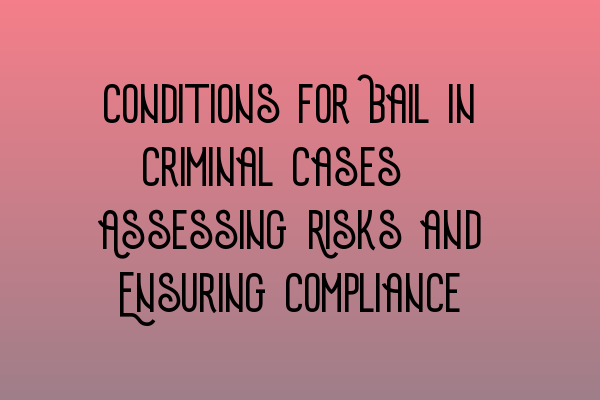Conditions for Bail in Criminal Cases: Assessing Risks and Ensuring Compliance
When it comes to criminal cases, one of the most important considerations is whether the defendant should be granted bail. Bail allows the defendant to be released from custody while awaiting trial, but it is subject to certain conditions to ensure the safety of the community and the defendant’s compliance with legal obligations.
At SQE Criminal Law & Practice Law UK, we understand the significance of bail conditions in criminal cases. In this article, we will delve into the key factors that influence the granting of bail and the importance of assessing risks and ensuring compliance.
The Role of Bail Conditions
Before we explore the conditions for bail, let’s understand why they exist. The primary purpose of bail conditions is to manage risk. The court needs to balance the right of the defendant to be considered innocent until proven guilty with the need to protect the community and maintain public trust in the justice system.
By imposing specific conditions, the court aims to minimize the risk of the defendant committing further offenses, interfering with witnesses, or fleeing from justice. These conditions can range from restrictions on movement and communication to requirements for drug testing or attending rehabilitation programs.
Assessing Risks
When determining the conditions for bail, the court assesses various factors to evaluate the level of risk posed by the defendant:
- Severity of the offense: The court considers the seriousness of the alleged crime and the potential harm it may cause to the community.
- Criminal history: Past convictions or pending charges are important indicators of a defendant’s propensity to reoffend or disobey court orders.
- Flight risk: The court evaluates whether the defendant is likely to abscond and fail to appear for trial.
- Threat to witnesses or victims: If there is a concern that the defendant may intimidate, harass, or interfere with witnesses or victims, appropriate conditions will be imposed to ensure their safety.
By carefully analyzing these factors, the court can tailor the conditions for bail to manage the specific risks associated with each individual case.
Ensuring Compliance
Once bail conditions are set, it is essential for the defendant to strictly adhere to them. Compliance with bail conditions not only demonstrates respect for the legal process but also helps to maintain trust in the defendant’s commitment to their defense.
However, it is not uncommon for defendants to unintentionally violate their bail conditions or struggle to meet certain requirements. In these situations, it is crucial to seek legal advice promptly to address any issues and avoid potential consequences.
At SQE Criminal Law & Practice Law UK, we provide comprehensive legal assistance to defendants navigating the complexities of bail conditions. Our experienced solicitors will guide you through the process, ensuring clear understanding of your obligations and helping you comply with the conditions imposed.
In summary, bail conditions in criminal cases play a crucial role in managing risks and ensuring compliance. By assessing the level of risk posed by the defendant and tailoring conditions accordingly, the court can strike a balance between protecting the community and safeguarding the rights of the accused.
If you require further guidance on criminal law, practice exams, or preparation courses, please feel free to explore our related articles:
- SQE 1 Practice Exam Questions
- SQE 1 Practice Mocks FLK1 FLK2
- SQE 2 Preparation Courses
- SQE 1 Preparation Courses
- SRA SQE Exam Dates
Our team at SQE Criminal Law & Practice Law UK is here to assist you every step of the way.
